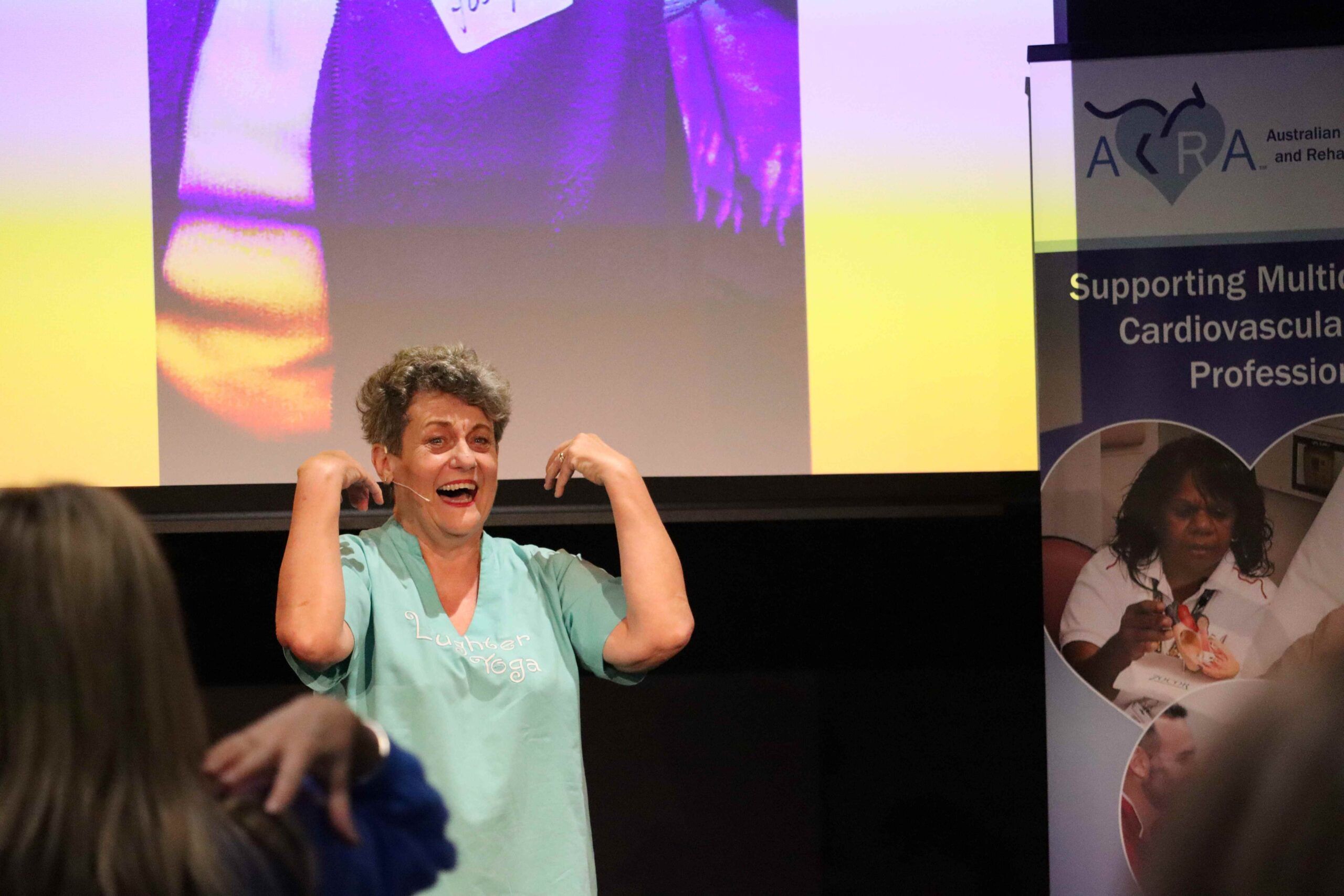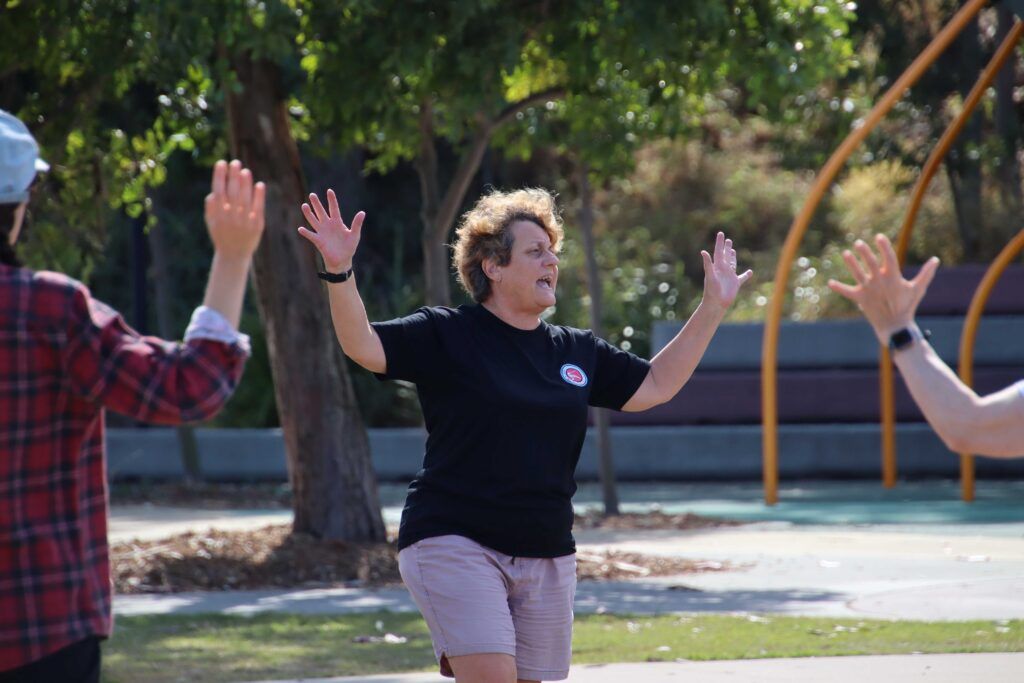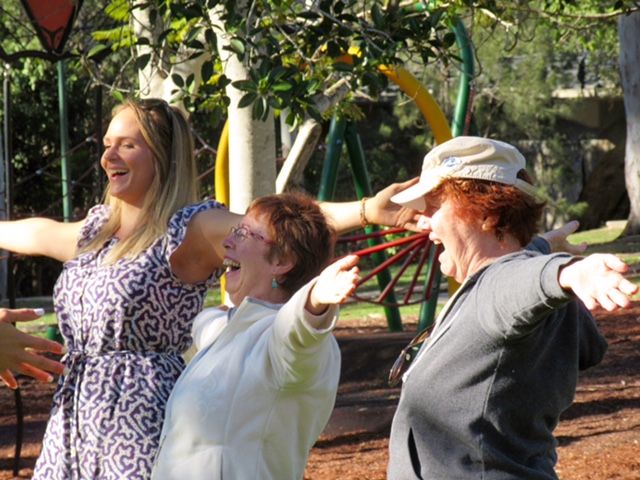
Laughter Yoga: A Heart-Smart Addition to Cardiac Rehabilitation
Could laughter be the good medicine for your heart? Science—and experience—say yes.
Healthcare professionals know how important physical activity is after heart surgery or cardiac events. But alongside movement, there’s another healing force often overlooked in cardiovascular rehabilitation: laughter.
More than just a feel-good moment, Laughter Yoga is a structured, evidence-informed practice that combines joyful intentional laughter with breathwork, clapping, and gentle playful movement, delivering both physiological and emotional benefits that directly support heart—and mind—health.
Today at the Australian Cardiovascular Rehabilitation Association Annual Scientific Meeting in Brisbane, I took the opportunity to outline how Laughter Yoga can play a meaningful role in cardiac recovery, stress reduction, and emotional resilience—and why it’s worthy of consideration in the cardiac rehabilitation prescriptions.
What is Laughter Yoga?
Despite the name, Laughter Yoga has nothing to do with downward dog while giggling.
Developed by Indian physician Dr Madan Kataria in 1995, it’s a body-mind practice that blends voluntary laughter exercises with yogic breathing (pranayama) and playful social interaction.
Laughter isn’t sparked by humour. We laugh because we can. The body responds to this intentional laughter the same way it does to spontaneous laughter, sending signals from the brain that trigger relaxation, joy, and healing.
Why Laughter Yoga matters for heart health
When it comes to cardiovascular wellness, Laughter Yoga offers a surprising range of clinically relevant benefits:
- Improves Vascular Function
A groundbreaking study at the University of Maryland found that laughter leads to vasodilation—the expansion of blood vessels—similar to the effect of aerobic exercise. This means improved blood flow and reduced strain on the heart.
- Lowers Blood Pressure and Heart Rate
Regular laughter can significantly reduce both systolic and diastolic blood pressure.
A 2011 study in the American Journal of Lifestyle Medicine showed that just 30 minutes of laughter per week helped lower blood pressure in hypertensive individuals. That’s just one laughter club session a week!
- Reduces Stress Hormones
Laughter reduces levels of cortisol, the stress hormone linked to inflammation and cardiac events. Less cortisol means a calmer nervous system and a reduced risk of future complications.
This finding has been replicated many times, including in the ABC-TV Catalyst episode on The Science of Relationships.
- Provides Mild Cardiovascular Activation
Though low-impact, Laughter Yoga involves deep diaphragmatic breathing and rhythmic movement, gently activating the heart and lungs.
Research shows improvements in Heart Rate Variability (HRV)—a key marker of autonomic nervous system health.
The psychological side: mental health and heart healing

The emotional impact of heart disease is profound. Anxiety, depression, and social withdrawal are common in cardiac patients. Here’s where Laughter Yoga truly shines:
- Boosts Mood Naturally
Laughter floods the body with feel-good hormones like dopamine, oxytocin, serotonin, and endorphins (a.k.a. the “DOSE” effect). These chemicals help reduce symptoms of depression and improve overall outlook during recovery.
- Restores Connection and Community
While Laughter Yoga can be practised alone, it is generally a socially supportive group activity. Participants share laughter with each other, not at each other—creating a sense of belonging and shared purpose that’s often missing in post-operative recovery.
I describe it as “speed-friending with benefits.” And for many, it’s the first time participants have laughed in weeks.
When Laughter Yoga was integrated into a cardiac rehabilitation program in a 3-month pilot for heart patients in Japan, positive results mind and body impacts were measured:
- improved ejection fraction (which measures the heart’s pumping efficiency)
- reduced cortisol (stress hormone)
- fewer symptoms of depression.
Growing Laughter Yoga for heart health
Much like the very popular Heart Foundation’s walking program in Australia, Laughter Yoga is:
- easy to learn
- adaptable
- doesn’t require special equipment.
Laughter clubs, run by trained volunteers, are free or very low cost for participants.
Laughter sessions can also be facilitated online, overcoming geographic challenges.
With this in mind, Laughter Yoga could be a scalable sustainable wellness tool for individuals at any stage of recovery.
Laughter Yoga isn’t a replacement for medical treatment or structured exercise—it’s a complementary therapy that nurtures the mind, body, and spirit.
When you consider the emotional strain, social isolation, and physical limitations that often follow cardiac events, practices like Laughter Yoga offer gentle empowerment and genuine joy.
As Dr. Kataria said:
“There may not be much laughter in medicine—but there is a lot of medicine in laughter.”
Want to experience Laughter Yoga for yourself or introduce it to your rehab program, explore workshop and training options, or check out social prescribing options? Drop me a line.

HeatherJoy Campbell is Laughter Yoga International’s Australian global ambassador. A professional facilitator and trainer (and former medical journalist), she delivers laughter yoga wellbeing sessions and workshops in workplaces, community centres and aged care, runs two laughter clubs and is the lead trainer of ‘laughter leaders’ in Queensland.